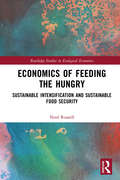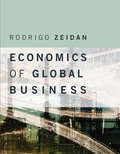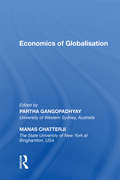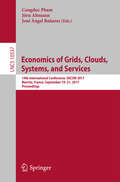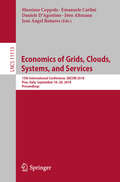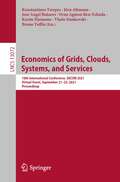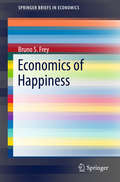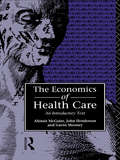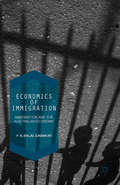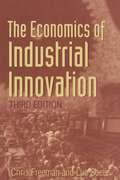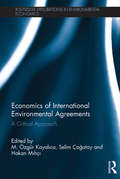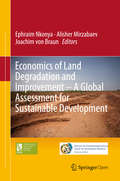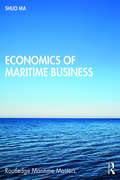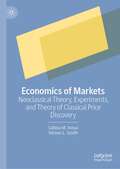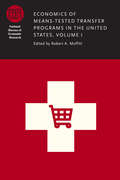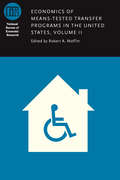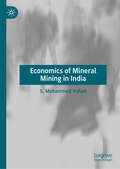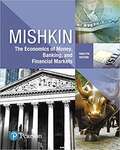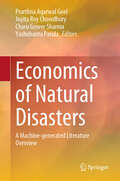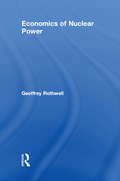- Table View
- List View
Economics of Feeding the Hungry: Sustainable Intensification and Sustainable Food Security (Routledge Studies in Ecological Economics)
by Noel RussellAs productivity expands to cater for population increase and shifting diets, many individuals remain hungry, whilst others suffer obesity, and significant amounts of food are wasted. Yet, this triple dilemma oversimplifies the underlying complexity. This book explores this complexity from an economics perspective, looking at the processes involved and the institutional structures that direct and constrain their interaction. After discussing alternative approaches to measuring hunger and food insecurity, this volume considers the four dimensions of food security: availability, affordability, utilization and stability. In summarising the main debates, issues and policy interventions, Russell discusses the problems of ensuring sufficient food in the face of ever-slowing growth in productivity and constraints on land and water. The problems of food affordability, the need for safety nets, and the need for poverty alleviation measures that reach excluded and disadvantaged groups is also discussed. This is alongside an exploration of issues related to food utilization and the problems of hidden hunger, obesity, food waste, and the interventions needed to relieve these problems. This volume is of great interest to those who study rural development, ecological economics and development economics, as well as policy makers who seek a better understanding of underlying processes, ongoing and emerging issues, and potentially relevant interventions.
Economics of Food Retailing
by Daniel I. PadbergThe primary goal in this presentation is to carry the available economic data on food retailing through to logical conclusions on industry performance. The Food Commission could not agree on an interpretation of these data--both majority and minority members showing a strong propensity to political positions of long standing. The large size and importance of the food retailing industry and its proximity to consumers cast this industry inevitably and eternally in the light of public view, political curiosity, and increasing governmental regulation. This vulnerability identifies the need for a clear understanding of the retailing market structure, competitive behavior, and the kind of social performance which grows therefrom..
Economics of Global Business
by Rodrigo ZeidanA textbook with innovative real-world macroeconomic analyses of timely policy issues, with case studies and examples from more than fifty countries. This timely and refreshingly real–world focused textbook examines some of the world's most critical policy issues through a macroeconomics lens. After presenting analytical foundations, modeling tools, and theoretical perspectives, Economics of Global Business goes a step further than most other texts, with a practical look at the local and multinational tradeoffs facing economic policymakers in more than fifty countries. Topics range from income equality and the financial crisis to GDP, inflation and unemployment, and, notably, one of the first macroeconomic examinations of climate change. Written by a globetrotting economist who teaches and consults on three continents, Economics of Global Business aims not for definitive answers but rather to provide a better understanding of the context-dependent rationales, constraints, and consequences of economic policy decisions. The book covers long-run and short-run growth (with examples from the United States, China, the European Union, South Korea, Japan, Latin America, Africa, Australia, and Vietnam); financial crises and central banks; monetary and fiscal policies; government budgets; currency regimes; climate change and macroeconomics; income inequality; and globalization. All chapters rely on recent and historical examples of economic policy in action. The book is particularly suitable for use as an introduction to macroeconomics for business students.
Economics of Global Business
by Stern School of BUsinessLearn more about the global economy, and the factors that influence business and government policy.
Economics of Globalisation
by Manas Chatterji Partha GangopadhyayGlobalisation has evolved to become the dominant economic, cultural, environmental and political phenomenon of our time. In economic terms, debates now extend beyond concepts of 'winners and losers', to key questions of how to deal with the problems unleashed by globalisation while preserving its benefits. However, if the benefits of globalisation are fairly shared and the costs properly dealt with, a deeper economic understanding of how globalisation is impacting our economic world is needed. This important book addresses this task, featuring contributions from many of the world's leading economists. Seven key aspects of globalisation are considered: trans-border trade, trans-border movement of people and capital, the emergence of a new international order, the homogenization of economic cultures, technology and institutions, labour market consequences, corporate governance issues, and prospects for a global society. These carefully chosen themes illuminate the complex path that globalisation is following by showing it to be a process consisting of various transitions and subplots, the totality of which is closely examined in this comprehensive and authoritative work. Economics of Globalisation is essential reading for academics, researchers, policy-makers and business professionals.
Economics of Grids, Clouds, Systems, and Services: 14th International Conference, GECON 2017, Biarritz, France, September 19-21, 2017, Proceedings (Lecture Notes in Computer Science #10537)
by Jörn Altmann José Ángel Bañares Congduc PhamThis book constitutes the refereed proceedings of the 14th International Conference on Economics of Grids, Clouds, Systems, and Services, GECON 2017, held in Biarritz, France, in September 2017.The 10 full papers and 10 short papers presented together with 3 invited talks were carefully reviewed and selected from 38 submissions.This volume of the GECON 2017 proceedings has been structured in sections following the sessions that comprised the conference program:Pricing in Cloud and Quality of Service, Work in Progress on Service Management, Work in Progress on Business models and Community Cooperation, Work in Progress on Energy Efficiency and Resource Management, Resource Management, Edge Computing, Cloud Federation; and Work in Progress on Service Selection and Coordination.
Economics of Grids, Clouds, Systems, and Services: 15th International Conference, GECON 2018, Pisa, Italy, September 18–20, 2018, Proceedings (Lecture Notes in Computer Science #11113)
by Jörn Altmann José Ángel Bañares Massimo Coppola Emanuele Carlini Daniele D’AgostinoThis book constitutes the refereed proceedings of the 15th International Conference on Economics of Grids, Clouds, Systems, and Services, GECON 2018, held in Pisa, Italy, in September 2018. The 21 full papers and 9 short papers presented together with 1 invited talk were carefully reviewed and selected from 40 submissions.This GECON 2018 proceedings was structured in three special sessions on selected topics, namely: IT service ecosystems enabled through emerging digital technologies; machine learning, cognitive systems and data science for system management; and blockchain technologies and economics.
Economics of Grids, Clouds, Systems, and Services: 18th International Conference, GECON 2021, Virtual Event, September 21–23, 2021, Proceedings (Lecture Notes in Computer Science #13072)
by Jörn Altmann José Ángel Bañares Konstantinos Tserpes Karim Djemame Bruno Tuffin Orna Agmon Ben-Yehuda Vlado StankovskiThis book constitutes the refereed proceedings of the 18th International Conference on Economics of Grids, Clouds, Systems, and Services, GECON 2021, in September 2021. Due to COVID-19 pandemic the conference was held virtually hosted by the Libera Università Maria SS. Assunta (LUMSA), Rome, Italy. The 7 full papers and 2 short papers presented in this book were carefully reviewed and selected from 41 submissions. In addition, this book includes 8 work-in-progress papers and 2 extended abstracts. Chapters “AI Technologies and Motives for AI Adoption by Countries and Firms: A Systematic Literature Review”; “Knowledge Management Framework for Cloud Federation”; “Architecture for Orchestrating Containers in Cloud” and “Towards Software Compliance Specification and Enforcement using TOSCA” are available open access under a Creative Commons Attribution 4.0 International License via link.springer.com.
Economics of Happiness (The\international Library Of Critical Writings In Economics Ser. #271)
by Bruno S. FreyThis book focuses on what makes people happy. The author explains methods for measuring subjective life satisfaction and well-being by discussing economic and sociodemographic factors, as well as the psychological, cultural and political dimensions of personal happiness. Does higher income increase happiness? Are people in rich countries, such as the United States, the United Kingdom and Scandinavian countries, happier than those living elsewhere? Does losing one’s job make one unhappy? What is the role of genetic endowments inherited from our parents? How important are physical and emotional health to subjective life satisfaction? Do older people tend to be happier, or younger people? Are close social relationships necessary for happiness? Do political conditions, such as respect for human rights, democracy and autonomy, play a part? How can governments contribute to the population’s happiness? This book answers these questions on the basis of extensive interdisciplinary research reflecting the current state of knowledge. The book will appeal to anyone interested in learning more about the various dimensions of personal well-being beyond the happiness-prosperity connection, as well as to policymakers looking for guidance on how to improve happiness in societies.
Economics of Health Care
by John Henderson Alastair Mcguire Gavin MooneyFirst published in 1987. Routledge is an imprint of Taylor & Francis, an informa company.
Economics of Immigration: The Impact of Immigration on the Australian Economy
by P. N. JunankarPoverty, famines, wars, and ethnic conflicts lead to large movements of refugees. The papers in this book provide an analysis of the economics of immigration. Junankar discusses why people migrate, the likely destinations for migrants, and their employment in the destination countries. He studies the benefits to the migrant families in terms of higher wages and living standards, and also studies how immigrants fare in the Australian labour markets in terms of finding good jobs, and whether there is discrimination against them. Economics of Immigration analyses the macroeconomic impacts of immigration on the Australian economy and discusses why some groups favour immigration while other groups are against it.Junankar argues immigration has been beneficial for employment and growth; not only adding to labour supply but also to labour demand, hence leading to favourable outcomes. This collection of essays shows how immigration has helped the economic development of Australia, while also highlighting that the historical reasons for immigration lie in the colonisation of many countries in Asia and Africa.
Economics of Industrial Innovation
by Chris Freeman Luc SoeteFirst Published in 2000. Routledge is an imprint of Taylor & Francis, an informa company.
Economics of Information Security and Privacy III
by Bruce SchneierThe Workshop on the Economics of Information Security (WEIS) is the leading forum for interdisciplinary scholarship on information security, combining expertise from the fields of economics, social science, business, law, policy and computer science. Prior workshops have explored the role of incentives between attackers and defenders, identified market failures dogging Internet security, and assessed investments in cyber-defense. Current contributions build on past efforts using empirical and analytic tools to not only understand threats, but also strengthen security through novel evaluations of available solutions. Economics of Information Security and Privacy III addresses the following questions: how should information risk be modeled given the constraints of rare incidence and high interdependence; how do individuals' and organizations' perceptions of privacy and security color their decision making; how can we move towards a more secure information infrastructure and code base while accounting for the incentives of stakeholders?
Economics of Institutional Change: Central and Eastern Europe Revisited (Studies in Economic Transition)
by Elodie Douarin Tomasz MickiewiczTwenty years ago, about thirty nations in Europe and Central Asia embarked on their economic transition path. For some, the outcome was a considerable success. However, several others are still struggling to shed the inheritance of their past and to correct more recent policy mistakes. Some are likely to bounce back from the 2008-2009 recession with energy, whilst others seem to be sliding back again into a period of poor performance and fiscal disarray. Why is performance so different? Was democracy a factor that facilitated reforms or, rather, slowed them down? Which reforms matter, and why are some so difficult to implement? Tomasz Mickiewicz discusses these questions maintaining a broad, comparative perspective. This revised and updated edition examines the process of institutional change, focusing on its characteristics, determinants and implications for economic performance and development. This book is indispensable reading for all interested in transition economics, economic growth, and European economics.
Economics of International Environmental Agreements: A Critical Approach (Routledge Explorations in Environmental Economics)
by Selim Çağatay M. Özgür Kayalıca Hakan MıhçıInternational environmental agreements provide a basis for countries to address ecological problems on a global scale. However, countries are heterogeneous with respect to their economic structures and to the problems relating to the environment that they encounter. Therefore, economic externalities and global environmental conflicts are common and can cause problems in implementation and compliance with international agreements. Economics of International Environmental Agreements illuminates those issues and factors that might cause some countries or firms to take different positions on common problems. This book explores why international environmental agreements deal with some problems successfully but fail with others. The chapters address issues that are global in nature, such as: transboundary pollution, provision of global public goods, individual preferences of inequality- aversion, global cooperation, self-enforcing international environmental agreements, emission standards, abatement costs, environmental quota, technology agreement and adoption and international institutions. They examine the necessary conditions for the improved performance of international environmental agreements, how cooperation among countries can be improved and the incentives that can be created for voluntary compliance with international environmental agreements. This text is of great importance to academics, students and policy makers who are interested in environmental economics, policy and politics, as well as environmental law.
Economics of Land Degradation and Improvement - A Global Assessment for Sustainable Development
by Joachim Braun Ephraim Nkonya Alisher MirzabaevThis volume deals with land degradation, which is occurring in almost all terrestrial biomes and agro-ecologies, in both low and high income countries and is stretching to about 30% of the total global land area. About three billion people reside in these degraded lands. However, the impact of land degradation is especially severe on livelihoods of the poor who heavily depend on natural resources. The annual global cost of land degradation due to land use and cover change (LUCC) and lower cropland and rangeland productivity is estimated to be about 300 billion USD. Sub-Saharan Africa (SSA) accounts for the largest share (22%) of the total global cost of land degradation. Only about 38% of the cost of land degradation due to LUCC - which accounts for 78% of the US$300 billion loss - is borne by land users and the remaining share (62%) is borne by consumers of ecosystem services off the farm. The results in this volume indicate that reversing land degradation trends makes both economic sense, and has multiple social and environmental benefits. On average, one US dollar investment into restoration of degraded land returns five US dollars. The findings of the country case studies call for increased investments into the rehabilitation and restoration of degraded lands, including through such institutional and policy measures as strengthening community participation for sustainable land management, enhancing government effectiveness and rule of law, improving access to markets and rural services, and securing land tenure. The assessment in this volume has been conducted at a time when there is an elevated interest in private land investments and when global efforts to achieve sustainable development objectives have intensified. In this regard, the results of this volume can contribute significantly to the ongoing policy debate and efforts to design strategies for achieving sustainable development goals and related efforts to address land degradation and halt biodiversity loss.
Economics of Maritime Business (Routledge Maritime Masters)
by Shuo MaThis book provides a comprehensive introduction to the economics of the business of maritime transport. It provides an economic explanation of four aspects of maritime transport, namely, the demand, the supply, the market and the strategy. The book first explains why seaborne trade happens and what its development trends are; it then analyses the main features of shipping supply and how various shipping markets function; the book finally addresses the critical strategic issues of the shipping business. The full range of different types of shipping are covered throughout the chapters and cases. The book combines the basic principles of maritime transport with the modern shipping business and the latest technological developments, particularly in the area of digital disruption. The ideas and explanations are supported and evidenced by practical examples and more than 160 tables and figures. The questions posed by the book are similar to those that would be asked by the students in their learning process or the professionals in the business environment, with the answers concentrating on the reasons for what has happened and will happen in the future rather than merely fact-telling or any specific forecast. The book is most suited for students of shipping-related disciplines, and is also a valuable reference for maritime professionals.
Economics of Markets: Neoclassical Theory, Experiments, and Theory of Classical Price Discovery
by Vernon L. Smith Sabiou M. InouaThis book establishes that neoclassical economics based on the marginal utility calculus failed to derive a theory of consumer market price discovery consistent with the experimental market evidence. Such markets involve inherently discrete final-demand items bought for consumption and not subject to resale. Classical economists following Adam Smith articulated a rich narrative of price discovery theory consistent with experimental evidence based on operational concepts of discrete demand values (maximum willingness-to-pay), and symmetrically, supply costs (minimum willingness-to-accept). We develop and extend a mathematical model of classical market price formation. Chapter 1 & 2 describes this theme and chapter 3 connects it with experiments. Chapter 4 builds on experimental examples for an intuitive overview of the theory. A partial equilibrium version of the theory constitutes Chapter 5. Chapter 6 extends this framework to price formation by wealth constrained agents in multiple-goods markets. Chapter 7 applies this framework to the study of re-tradable durable-goods and financial claims that are subject to sources of instability absent in markets for consumer non-durables.
Economics of Means-Tested Transfer Programs in the United States, Volume I
by Robert A. MoffittFew government programs in the United States are as controversial as those designed to help the poor. From tax credits to medical assistance, the size and structure of the American safety net is an issue of constant debate. These two volumes update the earlier Means-Tested Transfer Programs in the United States with a discussion of the many changes in means-tested government programs and the results of new research over the past decade. While some programs that experienced falling outlays in the years prior to the previous volume have remained at low levels of expenditure, many others have grown, including Medicaid, the Earned Income Tax Credit, the Supplemental Nutrition Assistance Program, and subsidized housing programs. For each program, the contributors describe its origins and goals, summarize its history and current rules, and discuss recipients’ characteristics and the types of benefits they receive. This is an invaluable reference for researchers and policy makers that features detailed analyses of many of the most important transfer programs in the United States.
Economics of Means-Tested Transfer Programs in the United States, Volume II
by Robert A. MoffittFew government programs in the United States are as controversial as those designed to help the poor. From tax credits to medical assistance, the size and structure of the American safety net is an issue of constant debate. These two volumes update the earlier Means-Tested Transfer Programs in the United States with a discussion of the many changes in means-tested government programs and the results of new research over the past decade. While some programs that experienced falling outlays in the years prior to the previous volume have remained at low levels of expenditure, many others have grown, including Medicaid, the Earned Income Tax Credit, the Supplemental Nutrition Assistance Program, and subsidized housing programs. For each program, the contributors describe its origins and goals, summarize its history and current rules, and discuss recipients’ characteristics and the types of benefits they receive. This is an invaluable reference for researchers and policy makers that features detailed analyses of many of the most important transfer programs in the United States.
Economics of Mineral Mining in India
by S. Mohammed IrshadThis book explores the theoretical and practical challenges of engaging with climate and disaster risk in the changing context of capital investments and market expansion. It explains the emergence of an at-risk society and its interface with economic decision-making. The critical issue the book explores is the implication of certainty over the return period of risk and its influence on the economic behaviour of the state and market institutions. Risk sharing and governing economic risks in the context of financial capitalism is a major theoretical issue the book engages with. It offers a new conceptual framework to see how risk economics evolves out of increasing climate and disaster risks and a counter-discourse on the mainstream economic theoretical standpoint on capital. It also explains the economics of capital replacement in vulnerable social systems. These broader perspectives will benefit economists, researchers, disaster and climate risk experts, the corporate sector, economics teachers, financial economics, and development policy making. Also, it examines climate change and disaster's theoretical and practical implications on capital formation and accumulation in the contemporary economic system. This book discusses risk mitigation and its interface with sustainable development goals, including climate action.
Economics of Money, Banking and Financial Markets
by Frederic MishkinFor courses in money and banking, or general economics. <P><P> A unified framework for understanding financial markets <P><P> The Economics of Money, Banking and Financial Markets brings a fresh perspective to today’s major questions surrounding financial policy. Influenced by his term as Governor of the Federal Reserve, Frederic Mishkin offers students a unique viewpoint and informed insight into the monetary policy process, the regulation and supervision of the financial system, and the internationalization of financial markets. The 12th Edition provides a unifying, analytic framework for learning that fits a wide variety of syllabi. Core economic principles and real-world examples organize students' thinking and keeps them motivated.
Economics of Natural & Environmental Resources (Routledge Revivals)
by Vernon L. SmithFirst written in 1977, Economics of Natural and Environmental Resources presents a collection of articles written in exploration of the economic, social, and ecological problems peculiar to natural and environmental resources. Whilst focusing on the economic theory of natural resources, the contributions also consider geological, technological, and institutional features of particular resources. Policy implications and considerations are central to the text and although the book was published over thirty years ago, the issues discussed remain relevant to today’s society.
Economics of Natural Disasters: A Machine-generated Literature Overview
by Prarthna Agarwal Goel Joyita Roy Chowdhury Charu Grover Sharma Yashobanta ParidaThis book is a machine-generated literature overview that explores the theoretical and empirical aspects of economics of natural disasters such as floods, cyclones, droughts, and earthquakes from a policy perspective. It provides a comprehensive collection of economic theories in Disasters and empirical findings that would benefit scholars in academia and policy-making. On the theory side, there is a growing use of game theory, Input-Output, computable general equilibrium models, and Catastrophe models to analyze the economic impacts of natural disasters. These models provide optimal decisions for the government concerning disaster relief. On the empirical front, studies showing causal and associative relationships between disasters and socio-economic variables are important for estimating disaster-related losses and making appropriate policy suggestions.The book explores different critical aspects and interlinkages of natural disasters; economic, social, and political. Besides having localized effects, disasters influence macroeconomic parameters, such as impacts on international trade and foreign direct investment. Moreover, the effects of disasters are subject to interventions from various national and international agencies. It discusses fiscal pressures caused due to disasters and existing policies related to disaster-risk mitigation and management as a guide to policy-making. It is an important guide to researchers and policymakers examining the socio-economic impact of natural disasters and public investment for disaster-risk mitigation.
Economics of Nuclear Power
by Geoffrey RothwellThis book is a unique introduction to the economic costs of nuclear power. It examines the future of the nuclear power industry and unpacks the complicated relationships between its technical, economic and political variables. It does so by modelling the costs, risks and uncertainties of one of the world’s most opaque industries using micro-econometrics, econometrics, and cost engineering. Economics of Nuclear Power examines the very important costs of externalities (storing of nuclear waste and the impact of a Chernobyl or Fukushima event) and compares those to the externalities of alternative carbon based energies (oil, coal, natural gas). With over 100 tables and figures this book details nuclear power production around the world - present and planned, providing a completely global focus. It also includes an overview of the past 70 years of international nuclear power developments. This book is essential reading for students, scholars and professionals interested in energy economics, nuclear engineering and energy policy.
